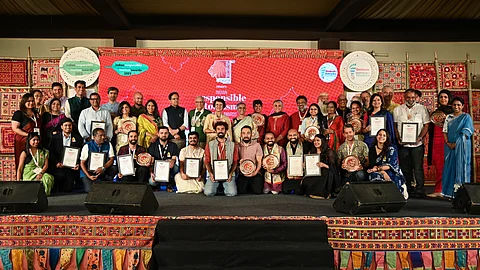
- Destinations
- Experiences
- Stay
- What's new
- Celebrating People
- Responsible Tourism
- CampaignsCampaigns
- SubscribeSubscribe
- Buy Now

Tourism is more than just a journey—it’s an impact. At the 10th edition of the Indian Responsible Tourism Summit and the 9th Responsible Tourism Awards (IRTA) 2025, held on 22nd February at Gujarat’s mesmerising Rann Utsav, industry leaders, conservationists, and grassroots innovators gathered to explore what ‘TravelNext’ truly means—rethinking travel for the planet, people, and future. Organised by the Outlook Responsible Tourism Initiative, the event showcased how responsible travel can drive preservation, inclusion, and innovation.
Held in collaboration with Gujarat Tourism, the event was further supported by state partners Meghalaya Tourism, Himachal Pradesh Tourism, and Jharkhand Tourism. Spain Tourism took centre stage as the destination partner, while the Global Sustainable Tourism Council (GSTC) provided valuable insights as the knowledge partner. With backing from Incredible India and UN Tourism, the summit underscored a strong commitment to global sustainable tourism efforts.
As Chief Guest, Dr Rajender Kumar, IAS, Secretary for Tourism, Government of Gujarat, highlighted the state’s pioneering initiatives in responsible tourism, from making the Rann Utsav plastic-free to fostering collaborations between local communities and the government.
The summit featured an influential lineup of industry experts, each bringing invaluable perspectives. Hari Krishnan, Managing Director, Content & Marcomm, Publicis Groupe India, and Rajneesh Sharma, VP Sustainability, MakeMyTrip, explored the power of digital storytelling in scaling responsible tourism businesses and connecting with Gen-Z travellers. Priya Krishnamoorthy, Founder & CEO of 200 MILLION ARTISANS, discussed the role of artisanal economies in tourism and strategies for small businesses to secure funding.
Discussions extended beyond business, delving into the social and environmental responsibilities of tourism. A panel featuring Aditi Chanchani, Ahmedaki Laloo, Malika Virdi, and Jahnabi Phookan shared insights on the role of women as custodians of intangible cultural heritage and how the travel ecosystem can support them.
Further into the summit, Pradip Krishen—author, naturalist, ecological restoration practitioner, and filmmaker—in conversation with Jehan Bhujwala, co-owner of The Bhuj House and Shergarh Tented Camp, Kanha, stressed the importance of first understanding a landscape and reversing damage before scaling up.
Keynote addresses sparked thought-provoking discussions. Arran John Sivarajah of Ceylon Wild Safaris spoke about the growing appeal of adventure tourism and the need to balance thrill with sustainability. Dr MK Ranjitsinh, author and chairman of the Wildlife Trust of India, made a compelling case for prioritising conservation over unchecked commercial expansion.
Shrutika Dewan, CMO of Outlook Group, underscored the importance of sustained engagement with state governments and grassroots communities, ensuring responsible tourism becomes a lived reality.
Adding to the dialogue, Shri Sukhvinder Singh Sukhu, Chief Minister of Himachal Pradesh, highlighted his government’s active role in fostering responsible travel. Meghalaya’s Tourism Minister, Bah Paul Lyngdoh, reinforced the state’s commitment to sustainable tourism, while Shri Sudivya Kumar, Tourism Minister of Jharkhand, discussed the state’s eco-tourism initiatives. Visitors at the event also experienced Jharkhand’s landscapes through an immersive VR setup.
Elena Maria, Director of Spain Tourism, shared insights into Spain’s pioneering sustainable tourism model, stating, "Sustainability in tourism means that economic, social, and environmental issues should be considered in a balanced way when tourism services are provided. This ensures that tourism remains a source of income and employment for destinations while protecting the environment, cultural heritage, and local communities."
Sandra Carvao, Director of UN Tourism, highlighted Dhordo’s recognition as a UN Tourism Best Tourism Village, underscoring the significance of hosting IRTA in this remarkable location.
A special address by Amitabh Kant, G20 Sherpa of India and President of the IRTA Jury, reinforced responsible tourism’s role in fostering resilience and sustainability. “Tourism, when done right, becomes a powerful tool for preservation, inclusion, and innovation,” he remarked.
The awards ceremony was the highlight of the evening, celebrating individuals and enterprises making strides in responsible tourism.
This year’s IRTA trophy pays tribute to Gujarat’s majestic Asiatic lion—the last wild population of its kind, found exclusively in Gir Forest. Inspired by its ecological and cultural significance, the design incorporates the traditional Mata ni Pachedi art form, featuring intricate red and black patterns symbolising strength, protection, and harmony. Crafted in collaboration with renowned artist Dilip Chitara, the trophy embodies the deep connection between local communities and conservation efforts.
The coveted ‘Overall Winner’ title was awarded to Edible Archives for its commitment to sustainable food experiences. Other winners included:
Gold: Dudhsagar Plantation, Goa & Hansali Organic Farm, Punjab
Silver: Fagunia Farmstay, Uttarakhand
One to Watch: Kurialacherry House, Kerala
Gold: Vaksana Farms, Tamil Nadu
Silver: SAGG Eco Village, Kashmir
One to Watch: Heritage Homestay, West Bengal & Drenmo Lodge, Ladakh
Gold: Barefoot Resort, Andaman and Nicobar Islands
Silver: Six Senses Vana, Uttarakhand
One to Watch: Xandari Pearl Beach Resort, Kerala
Gold: Agora Eco Tourism Pvt. Ltd., Chhattisgarh
Silver: Six Degree Adventures, Assam
One to Watch: Wildfloc Adventures Pvt. Ltd., Karnataka
Gold: Jabarkhet Nature Reserve, Uttarakhand
Silver: Unlock Hundurman - Museum of Memories, Ladakh
Outstanding Achievement Award: The Partition Museum, New Delhi
Gold: Edible Archives, Goa
Silver: A’Origins, Meghalaya
One to Watch: The Locavore, Kerala
Beyond discussions and accolades, the event paid homage to Gujarat’s rich artistic heritage. Kutch’s iconic Lippan art adorned the venue, seamlessly blending tradition with sustainability. The atmosphere came alive with soul-stirring performances by Shillong-based band Da Minot, in collaboration with the Meghalaya Grassroots Music Project, offering a contemporary yet deeply rooted Khasi cultural experience.
As IRTA 2025 concluded, it was evident that responsible tourism is no longer just a conversation—it’s a movement. The summit and awards reaffirmed that the future of travel must be both people- and planet-friendly, driven by collaboration, innovation, and an unwavering commitment to sustainability. These discussions and commitments will continue shaping the tourism landscape, ensuring it thrives in harmony with the world it seeks to explore.
